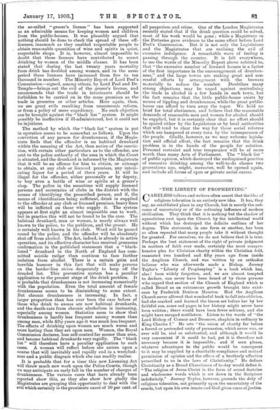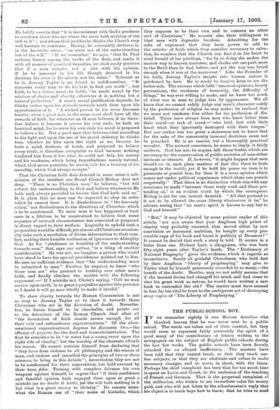"THE LIBERTY OF PROPHESYING."
CARELESS talkers and writers often assert that the idea of religious toleration is an entirely new idea. It has, they say, no established place in any Church, but is merely the out- come of uncertainty or of the softening influence of modern civilisation. They think that it is .nothing but the shadow of agnosticism cast upon the Church by the intellectual world without which has destroyed the definite outlines of her dogma. This statement, in one form or another, has been so often repeated that many people take it without thought for granted. For ourselves, we do not believe that it is true. Perhaps the best statement of the right of private judgment in matters of faith ever made, certainly the most compre- hensive plea for Christian charity within the Christian fold, emanated two hundred and fifty years ago from inside the Anglican Church, and was 'written by an orthodox believer who was afterwards made a Bishop. Jeremy Taylor's "Liberty of Prophesying" is a book which has, alas! been widely forgotten, and, we are almost tempted to declare, can never have been heard of by those persons who regard that section of the Church of England which is called Broad as an extraneous growth brought into exist- ence by Frederick Denison Maurice. Had the Anglican Church never allowed that wonderful book to fall into oblivion, had she marked and learned the lesson set before her by her faithful son, some sad pages in her history might never have been written ; there would have been fewer schisms, and she might have escaped mutilation. Listen to the words of "the Lord Bishop of Connor and Dromore, chaplain in ordinary to King Charles I." He sets "the union of charity far before a forced or pretended unity of persuasion, which never was, or ever will be, real or substantial, and although it would be very convenient if it could be had, yet it is therefore not necessary because it is impossible; and if men please, whatever advantages to the public would be consequent to it may be supplied by a charitable compliance and mutual permission of opinion and the offices of a brotherly affection prescribed to us in the laws of Christianity." He defines Christianity as a Broad Churchman of to-day would define it. "The religion of Jesus Christ is the form of sound doctrine and wholesome words which is set down in the Scripture indefinitely." Jeremy Taylor, however, grounds the duty of religious toleration, not primarily upon the uncertainty of the creeds, but upon his own innate and God-given sense of justice.
He boldly asserts that "it is inconsistent with God's goodness to condemn those who err where the error hath nothing of the will in it " ; and whom God justifies he thinks the Church may well hesitate to condemn. Heresy, he constantly declares, is, in the Apostolic sense, "an error not of the understanding but of the will." -" If we remember," he says, "that St. Paul reckons heresy among the works of the flesh, and ranks it with all manner of practical impieties, we shall easily perceive that if a man mingles not a vice with his opinion, if he be innocent in his life though deceived in his doctrine, his error is his misery, not his crime." Tolerant as he is, Jeremy Taylor is no friend to indifferentism. "It concerns every man to do his best to find out truth" ; but faith, to be a virtue, must, he holds, "be made moral by the mixture of choice and charity, otherwise it is nothing but a natural perfection." A man's moral justification depends, he thinks, rather upon his attitude towards truth than upon his apprehension of it. "A wicked person in his error becomes heretic, when a good man in the same error shall have all the rewards of faith, for whatever an ill man believes, if he there- fore believe it because it serves his own ends, he hath an heretical mind, for to serve his own ends his mind is prepared to believe a lie. But a good man that believes what according to his halt and upon the use of his moral industry he thinks true, whether he hits upon the right or no, because he bath a mind desirous of truth, and prepared to believe every truth, is therefore acceptable to God because nothing hindered him from it but what he could not help, his misery and his weakness, which being imperfections merely natural, which God never punishes, he stands fair for a blessing of his morality, which God always accepts."
That the Christian faith does demand in some sense a sub- mission of the intellect our Broad Chui.ch Bishop does not deny. "There is no Christian man," he believes, "but will submit his understanding to God and believe whatsoever He bath said, always provided he knows that God bath said so." It is plain that no man can be expected to obey an order which he cannot hear. It is disobedience to "the heavenly vision," not disobedience to the directions of Churches, which is to be condemned. To most men it has happened at least once in a lifetime to be constrained to believe that some sequence of outward circumstances was overruled or prepared in direct regard to their welfare. Logically to uphold such a proposition would be difficult, yet almost all Christians occasion- ally take such a revelation of divine intervention to their com- fort, making their humble confession of ignorance to Almighty God. As for "obedience or humility of the understanding towards men," that, says our author, "is a thing of another consideration." He was not, we imagine, a person who would have stood to have his special providences pointed out to him. He sees no sufficient evidence that "his understanding must be submitted to men." Further, he requires to know "who those men are" who pretend to lordship over other men's faith, and finally clinches the matter with the following argument :—" If I mistake not, Christ's saying, Call no man master upon earth,' is so great a prejudice against this pretence as I doubt it will go near wholly to make it invalid."
To show charity towards the Roman Communion is not so easy to Jeremy Taylor as to show it towards those Christians who err in the direction of doubt. Neverthe- less, he forces himself to be charitable, and points out to the detractors of the Roman Church that after all "the foundation of faith stands secure enough for all their vain and unhandsome superstructures." Of the afore- mentioned superstructural dogmas he discusses two,—the efficacy of prayers for the dead and transubstantiation. The first he considers to be "at worst but a wrong error upon the right side of charity," but the worship of the elements offends his reason. He cannot restrain himself from declaring that "they have done violence to all philosophy and the reason of man, and undone and cancelled the principles of two or three sciences, to bring in this Article "; nevertheless they are not to be condemned for their superstition, but held excused by their bona fides. Turning with complete fairness his own weapons against himself, he argues that "if their confidence and fanciful opinion bath engaged them upon so great a mistake (as no doubt it bath), yet the will bath nothing in it but what is a great enemy to idolatry." He resents some- what the Roman use of "their name of Catholic, which
they suppose to be their own and to concern no other sect of Christians." He resents also their willingness to bind men with dogmatic burdens. Admitting for the sake of argument that they have power to add to the articles of faith which they consider necessary to salva- tion, he wonders that the Church can find it in her heart to avail herself of her privilege, "for by so doing she makes the narrow way to heaven narrower, and chalks out one path more
to the Devil than he had before, and yet the way was broad enough when it was at the narrowest." Like the Founder of his faith, Jeremy Taylor's insight into human nature is quickened by love. He is ready to forgive, keen to see the better side. The excuses which befit " innocent opinions, hearty persuasions, the weakness of humanity, the difficulty of things,".. he was ever willing to make, and he knew too much of what was in man to judge him by appearance. We all know that we cannot safely judge any man's character solely by the profession of religion he may make ; he realised that we must not condemn him either for his profession of dis- belief. There have always been men who knew better than their creed—or lack of creed—" who held fast with their heart what they ignorantly destroyed with their tongue." But our author was too great a statesman not to know that for the sake of the community immoral doctrines must not be preached. He is no casuist, but a thoroughly practical moralist. The natural conscience, he seems to imply, is fairly uniform. God has not, he argues, left those truths which are necessary for the conservation of public societies of men either intricate or obscure. If, however, "it might happen that men should err in such plain matters of fact (for there be fools enough in the world), yet if he hold his peace no man is to persecute or punish him, for then it is a mere opinion which comes not under political cognisance, which alone can punish corporeally." That there is no distinction which can with any assurance be made "between those truly weak and those pre- tending so," is an evident truth by which the courageous Bishop is not for one instant daunted. "All that pretend to it are to be allowed the same liberty whatsoever it be," he advises, seeing that "no man's spirit is known to any but to God and himself."
"But," it may be objected by some patient reader of this article, "are you aware that your Anglican high priest of charity very probably recanted, that moved either by new conviction or increased ambition, he bought up every pro- curable copy of his book and burnt it publicly at Dromore ?" It cannot be denied that such a story is told. It occurs in a letter from one Michael Lort, a clergyman, who was born fifty-eight years after Taylor's death. The "Dictionary of National Biography" gives the evidence, which it regards as inconclusive. Surely all grateful Churchmen who hold fast by their Anglican "liberty of prophesying" may give to Taylor what he himself generously accorded to so many,—the benefit of the doubt. Besides, may we not safely assume that if the learned divine had changes his mind, and had come to view his great work as untrue, he would have written a new book to contradict the old ? The matter must have seemed to him far too vital to trust to the ambiguous act of destroying stray copies of The Liberty of Prophesying."











































 Previous page
Previous page